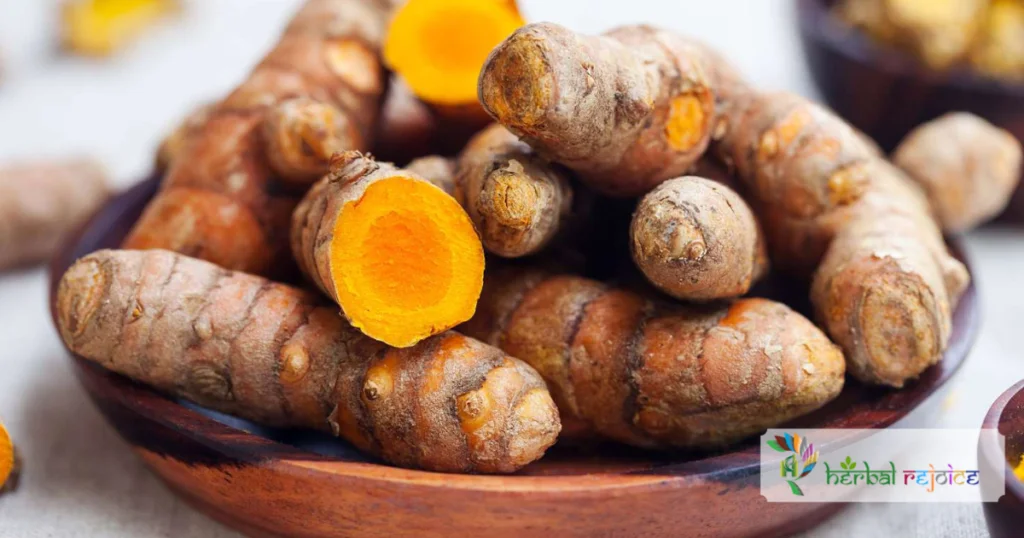Introduction:
Curcuma longa Linn., commonly known as Turmeric, is a revered spice belonging to the Zingiberaceae family. Cultivated extensively throughout India, particularly in West Bengal, Tamil Nadu, and Maharashtra, Turmeric has gained global recognition for both its culinary and medicinal properties. In this comprehensive article, we will dive into the English and scientific names of Turmeric, its traditional uses, potential health benefits, and dosage considerations. By uncovering its remarkable properties, we aim to showcase the immense value of Turmeric as a golden spice for promoting overall well-being.
Names and Habitat Of Turmeric
Turmeric, scientifically known as Curcuma longa Linn., is a spice that belongs to the Zingiberaceae family. It is cultivated extensively throughout India, with significant production in West Bengal, Tamil Nadu, and Maharashtra.
Traditional Uses and Benefits Of Turmeric
Turmeric has a rich history of traditional usage and offers various potential health benefits.
1. Anti-inflammatory and Antioxidant Properties:
One of the key actions of Turmeric is its anti-inflammatory effect. It also possesses antioxidant properties, contributing to its potential for protecting cells from oxidative damage and promoting overall well-being.
2. Hepatoprotective and Blood-Purifying Effects:
Turmeric is known to have hepatoprotective properties, safeguarding the liver from damage and supporting its healthy functioning. Additionally, it is recognized as a blood-purifying agent, aiding in the elimination of toxins from the body.
3. Gastroprotective and Stomachic Qualities:
Turmeric exhibits gastroprotective effects, providing relief from stress, alcohol, and drug-induced ulcer formation. It also acts as a stomachic, stimulating appetite and aiding in proper digestion.
4. Cholesterol-Lowering Effects:
Curcumin, a compound found in Turmeric, has been shown to help reduce high plasma cholesterol levels. It interferes with intestinal cholesterol uptake, increases the conversion of cholesterol into bile acids, and promotes the excretion of bile acids.

Chemical Composition and Key Components In Turmeric
Turmeric contains various compounds that contribute to its potential health benefits.
1. Curcuminoids:
The rhizomes of Turmeric yield curcuminoids, including curcumin and monodesmethoxycurcumin. These phenolic diarylheptanoids possess antioxidant, anti-inflammatory, and hepatoprotective activities. Curcumin, in particular, exhibits cholesterol-lowering effects and acts as a gastroprotective agent.
2. Volatile Oil:
Turmeric’s volatile oil contains turmerones, which are sesquiterpene ketones, along with bitter principles, sugars, starch, and resin. This oil contributes to the anti-inflammatory properties of Turmeric.
3. Curlone:
Extracted from the dried rhizome, curlone is used against hepatitis, further highlighting Turmeric’s potential role in supporting liver health.
4. Piperine:
Piperine, a constituent of black and long pepper, enhances the absorption and bioavailability of curcumin, maximizing its potential health benefits.
Potential Health Benefits Of Turmeric
Turmeric holds significant potential for various health benefits.
1. Anti-inflammatory and Antioxidant Effects:
The anti-inflammatory and antioxidant properties of Turmeric contribute to overall cellular health and protection against oxidative stress.
2. Liver Protection and Detoxification:
Turmeric’s hepatoprotective properties aid in liver protection and promote liver detoxification, supporting optimal liver function.
3. Digestive Health Support:
Turmeric’s stomachic qualities stimulate appetite, improve digestion, and promote gastrointestinal health, providing relief from digestive disorders.
4. Cholesterol Management:
Curcumin, a key compound in Turmeric, offers potential benefits in managing high cholesterol levels, contributing to heart health.
Dosage Of Turmeric
The recommended dosage of cured Turmeric rhizome is 1-3 grams of powder.
Conclusion:
Turmeric (Curcuma longa Linn.) is a versatile spice widely recognized for its culinary and medicinal uses. With its anti-inflammatory, antioxidant, and hepatoprotective properties, Turmeric offers a natural and holistic approach to promoting overall health and well-being.
By incorporating Turmeric into our daily lives, whether through delicious cuisines or supplementary forms, we can harness the immense benefits of this golden spice.
Embrace the power of Turmeric and unlock its full potential in enhancing your health journey.
Frequently Asked Questions (FAQs):
What is the scientific name for Turmeric?
Turmeric’s scientific name is Curcuma longa Linn.
Can Turmeric help with inflammation?
Yes, Turmeric possesses anti-inflammatory properties, which can help reduce inflammation in the body.
Does Turmeric have antioxidant effects?
Yes, Turmeric has antioxidant properties, which can protect cells from oxidative damage.
How does Turmeric support liver health?
Turmeric has hepatoprotective properties, which can safeguard the liver from damage and support its healthy functioning.
Is Turmeric beneficial for digestion?
Yes, Turmeric acts as a stomachic, stimulating appetite and aiding in proper digestion.
Can Turmeric help in lowering cholesterol levels?
Turmeric contains curcumin, a compound that has shown potential in managing high cholesterol levels.
What are the key components of Turmeric?
Turmeric contains curcuminoids, volatile oil with turmerones, curlone, and piperine, which contribute to its health benefits.
How can Turmeric be incorporated into daily routines?
Turmeric can be used as a spice in various cuisines, added to drinks or smoothies, or taken as a supplement in powder or capsule form.
What is the recommended dosage of Turmeric powder?
The recommended dosage of cured Turmeric rhizome powder is 1-3 grams.
Are there any side effects of Turmeric?
Turmeric is generally considered safe when consumed in moderate amounts. However, excessive consumption may cause stomach upset or interact with certain medications.
Can Turmeric be used topically?
Turmeric can be used topically in skincare or as a paste for minor skin conditions. However, patch testing is recommended.
Can Turmeric be used during pregnancy or breastfeeding?
It is advisable to consult healthcare professionals before using Turmeric during pregnancy or breastfeeding, as individual circumstances may vary.
Can Turmeric interact with medications?
Turmeric may interact with certain medications, especially blood thinners and drugs that affect the liver. Consult with healthcare professionals if you are taking any medications.
Is Turmeric supported by scientific research?
Turmeric has been extensively researched for its health benefits, and there is a growing body of scientific evidence supporting its potential therapeutic properties.
Can I buy Turmeric supplements online?
Turmeric supplements can be purchased online from reputable sellers and natural health product stores. Ensure to choose reliable sources.
How long should I take Turmeric to see results?
The timeframe for experiencing the benefits of Turmeric may vary depending on individual factors. Consistency in usage and following recommended dosages is important for optimal results.
Is Turmeric safe for long-term use?
Turmeric is generally safe for long-term use.


